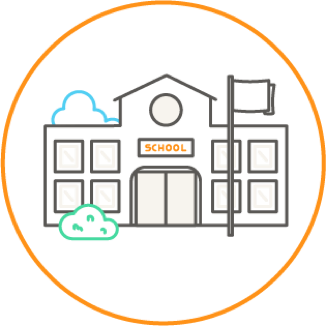Download Tool:
Indicators of Schoolwide SEL
When fully implemented, schoolwide SEL contributes to more successful and equitable outcomes for young people, and is evidenced by the following indicators.

Schoolwide SEL is evidenced by indicators of high-quality implementation in the classroom, school, family, and community.
When implemented systemically, schoolwide SEL integrates academic, social, and emotional learning across classrooms, school, homes and community. The School Guide identifies four focus areas for high-quality, systemic SEL implementation: Build foundational support and plan (Focus Areas 1A and 1B), Strengthen adult SEL competencies and capacity (Focus Area 2), Promote SEL for students (Focus Area 3), and Practice continuous improvement (Focus Area 4).
When these four focus areas are fully implemented, schools create an environment that infuses SEL into every aspect of students’ educational experiences and promote equitable outcomes for all students. While schoolwide SEL can take up to 3 to 5 years to be fully realized, schools can begin seeing evidence of high-quality implementation throughout the process.
These ten indicators of schoolwide SEL provide schools with evidence of high-quality implementation of the School Guide’s four focus areas. They are not a “checklist” or a “to-do” list, and attempting to address one or a few of these items in isolation without engaging in systemic implementation could lead to fragmented, siloed SEL.
View a walkthrough tool to observe for these indicators.


Explicit SEL instruction: Students have consistent opportunities to cultivate, practice, and reflect on social and emotional competencies in ways that are developmentally appropriate and culturally responsive.
Read more: Focus Area 3>Explicit SEL Instruction
Watch: Video

SEL integrated with academic instruction: SEL objectives are integrated into instructional content and teaching strategies for academics as well as music, art, and physical education.
Read more: Focus Area 3>SEL and Academic Instruction
Watch: Video

Youth voice and engagement: Staff honor and elevate a broad range of student perspectives and experiences by engaging students as leaders, problem solvers, and decision-makers.
Read more: Focus Area 3>Youth Voice and Engagement
Watch: Video

Supportive school and classroom climates: Schoolwide and classroom learning environments are supportive, culturally responsive, and focused on building relationships and community.
Read more: Focus Area 3>Supportive School Climate and Focus Area 3>Supportive Classroom Environment

Focus on adult SEL: Staff have regular opportunities to cultivate their own social, emotional, and cultural competence, collaborate with one another, build trusting relationships, and maintain a strong community.
Read more: Focus Area 2
Watch: Video

Supportive discipline: Discipline policies and practices are instructive, restorative, developmentally appropriate, and equitably applied.
Read more: Focus Area 3>Discipline Policies and Focus Area 3>Student-Centered Discipline Practices

A continuum of integrated supports: SEL is seamlessly integrated into a continuum of academic and behavioral supports, which are available to ensure that all student needs are met.
Read more: about Focus Area 3>Integrate Student Supports with SEL

Authentic family partnerships: Families and school staff have regular and meaningful opportunities to build relationships and collaborate to support students’ social, emotional, and academic development.
Read more: Focus Area 1 and Focus Area 3>Family Partnerships
Watch: Video

Aligned community partnerships: School staff and community partners align on common language, strategies, and communication around all SEL-related efforts and initiatives, including out-of-school time.
Read more: Focus Area 1 and Focus Area 3>Community Partnerships

Systems for continuous improvement: Implementation and outcome data are collected and used to continuously improve all SEL-related systems, practices, and policies with a focus on equity.
Read more: Focus Area 4